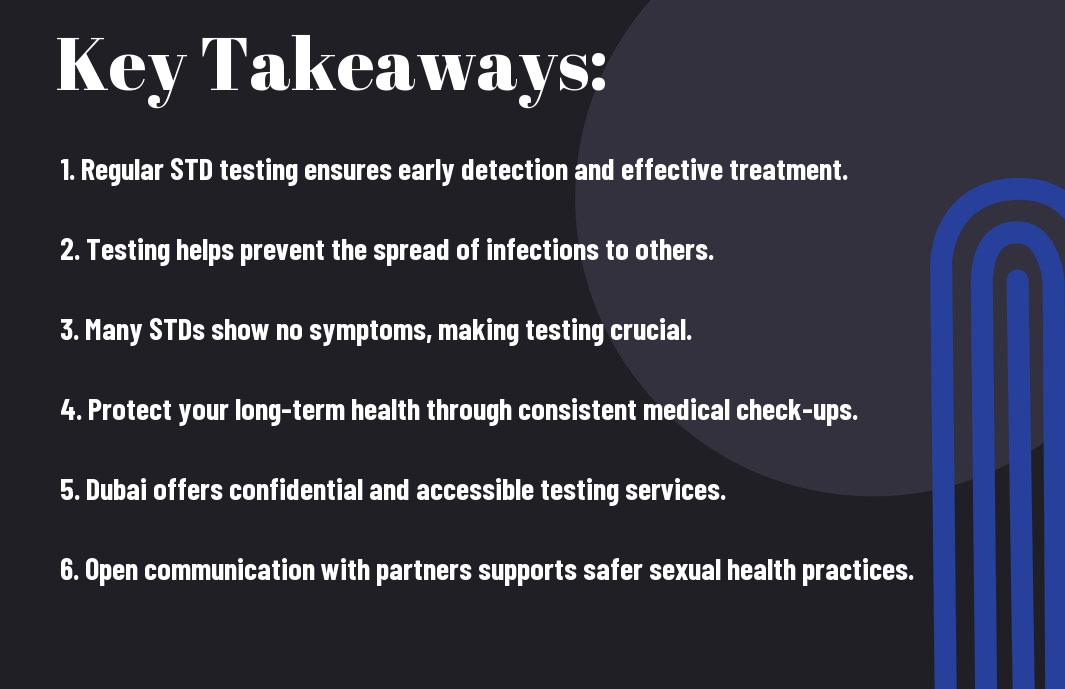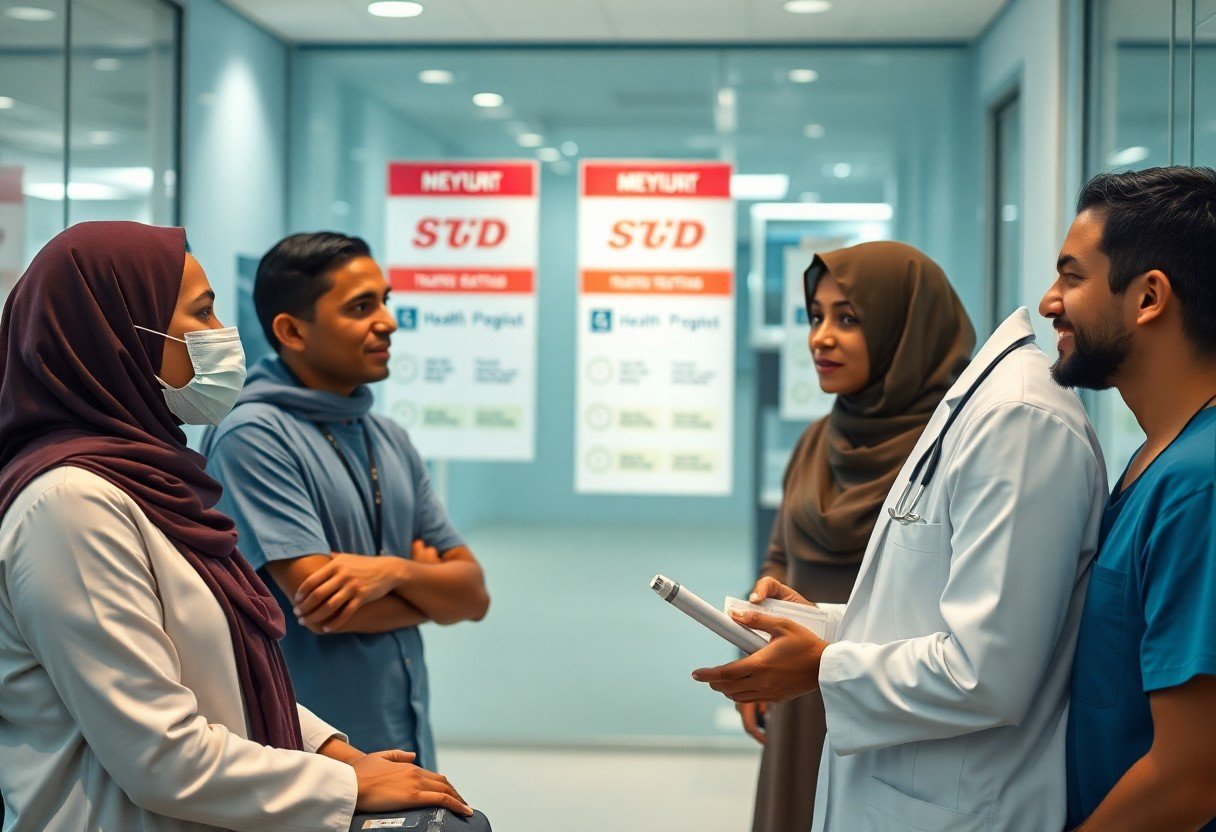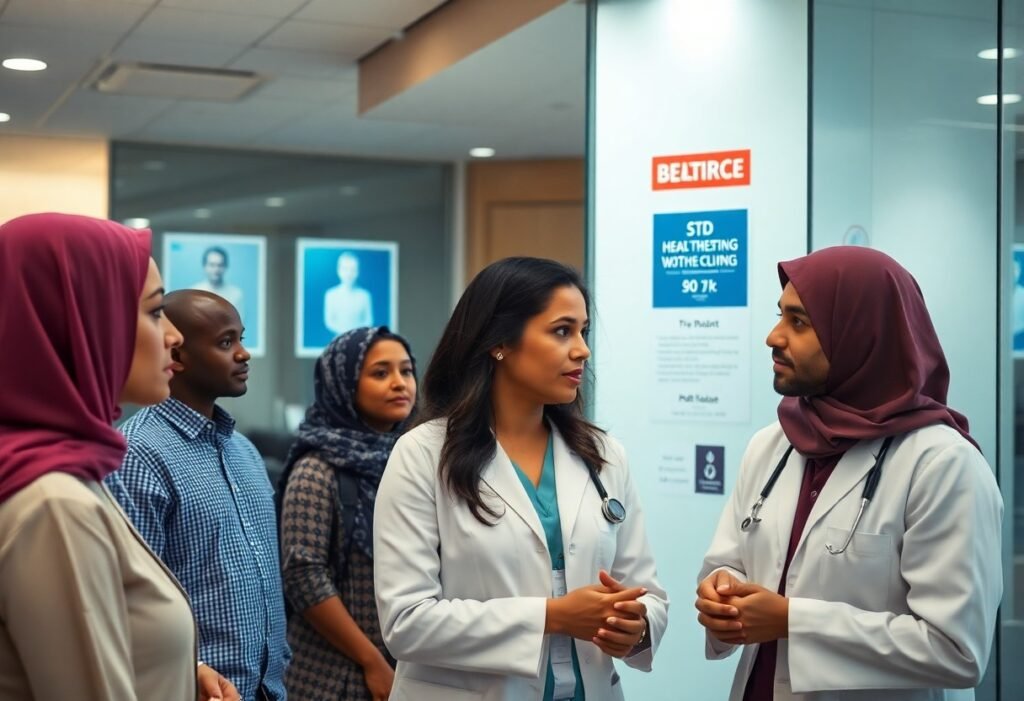Just as you prioritize your overall well-being, regular STD testing should be an necessary aspect of your health routine in Dubai. Engaging in safe practices is vital, but STDs can often be asymptomatic, making testing the only way to ensure your health and that of your partners. With early detection, you can prevent severe complications and receive timely treatment. Taking the proactive step to get tested not only protects you but also contributes to the health of your community, fostering a safer environment for everyone.
Key Takeaways:
- Regular STD testing is imperative for maintaining sexual health and preventing the spread of infections.
- Many STDs can be asymptomatic, making routine testing important for early detection and treatment.
- In Dubai, access to private and confidential STD testing services helps individuals seek necessary healthcare without stigma.
- Frequent testing can lead to better sexual health practices and informed decisions about relationships and safety.
- Awareness and education about STDs promote a healthier community and reduce the prevalence of infections.


Understanding STDs
The understanding of sexually transmitted diseases (STDs) is vital for your sexual health. STDs can affect anyone, regardless of age, gender, or sexual orientation. They are typically transmitted through intimate contact, and many individuals may not even realize they are infected. This lack of awareness can lead to severe health issues if left untreated. Regular testing empowers you to manage your health effectively and make informed decisions.
Common Types of STDs
- Chlamydia
- Gonorrhea
- Syphilis
- HIV
- Herpes
This categorization enables you to be aware of potential threats and take proactive measures for your health.
| Type | Description |
| Chlamydia | A common bacterial infection that may not show symptoms. |
| Gonorrhea | Another bacterial infection that can lead to serious complications. |
| Syphilis | A bacterial infection that can progress through multiple stages if untreated. |
| HIV | A viral infection that attacks the immune system. |
| Herpes | A viral infection characterized by painful sores. |
Symptoms and Risks
Against the backdrop of your wellbeing, being aware of STD symptoms and risks is imperative. Many STDs can remain asymptomatic for extended periods, making it easy for infections to spread unknowingly. Symptoms may often include unusual discharge, pain during intercourse, or sores. The risks associated with living with an untreated STD include potential infertility and the increased risk of acquiring or transmitting HIV. Regular testing can help you stay informed and in control of your sexual health.
Understanding your body and awareness of the potential symptoms is key to early detection and treatment of STDs. For instance, some of the most dangerous STDs, such as HIV, can lead to life-threatening complications, while others may affect your reproductive health or lead to chronic conditions. By paying attention to any changes in your body and maintaining a dialogue with your healthcare provider, you can ensure that your sexual health remains a priority. Additionally, recognizing positive aspects of proactive health measures empowers you to seek support and engage in healthy relationships.
The Importance of Regular Testing
You prioritize your health by keeping up with regular STD testing. In a vibrant city like Dubai, sexual health is often overlooked amid the fast-paced lifestyle. Yet, staying informed about your sexual health ensures you can make safer choices, leading to a healthier community overall. Regular testing empowers you to take charge of your well-being and fosters open communication in your relationships.
Early Detection and Treatment
Along with regular testing, early detection of STDs can significantly enhance your treatment options. Many STDs can be asymptomatic, meaning you might not even realize you’re infected. By getting tested routinely, you can catch any potential issues early, allowing for timely treatment that can minimize complications and keep you healthy.
Protecting Partners and Community
At the heart of regular testing is your responsibility towards your partners and the community. A proactive approach to sexual health not only safeguards your well-being but also protects others from potential infections. Regularly testing for STDs means you are actively taking part in preventing the spread of infections.
Consequently, your commitment to regular testing plays a vital role in community health. By ensuring that you are STD-free before engaging in sexual activity, you significantly reduce the likelihood of transmission to others. This collective responsibility fosters a safer environment for everyone, promoting healthier relationships and a stronger community. By approaching your sexual health with diligence, you’re not only looking out for yourself but also demonstrating care and accountability towards those around you.
Testing Locations in Dubai
For those seeking STD testing in Dubai, there are numerous locations available to cater to your needs. From public health services to private clinics, you can find options that ensure your privacy and comfort. These facilities provide a variety of testing methods and offer professional support, making it easier to maintain your sexual health.
Public Health Services
About the public health services in Dubai, you can access testing at government-run clinics that offer confidential STD testing for residents and visitors alike. These clinics are equipped to provide vital tests and are staffed with trained professionals who can guide you through the process, providing reassurance and confidentiality.
Private Clinics and Hospitals
With a number of private clinics and hospitals available in Dubai, you have the flexibility to choose a facility that aligns with your preferences and schedule. These establishments often provide a more personalized experience, with shorter wait times and enhanced privacy compared to public health services.
Considering the benefits of private clinics, many of them offer specialized services, including rapid testing and tailored healthcare plans. Additionally, you can expect high-quality care with less overcrowding, allowing for more focused consultations. Many facilities also accept various insurance plans, making it easier for you to access affordable and reliable STD testing, ensuring that your health remains a top priority.
How to Prepare for an STD Test
Many people wonder how to prepare for an STD test. It’s important to be aware of specific considerations, such as avoiding urination for at least one hour before the test if you’re having a urine test. Additionally, refrain from sexual activity for 24 hours prior, as this can help ensure accurate results. Lastly, make sure to consult with your healthcare provider about any medications you are taking, as some may affect the test results.
What to Expect During the Test
Above all, you should anticipate a straightforward process during your STD test. Depending on the type of test, you may provide a urine sample, a blood draw, or undergo a physical examination. The healthcare professional will guide you through each step, aiming to ensure your comfort and understanding. Most tests are quick, usually taking only a few minutes to complete.
Confidentiality and Privacy Concerns
Against prevailing misconceptions, your privacy during an STD test is taken very seriously. Healthcare providers adhere to strict confidentiality standards and laws to protect your personal health information.
Due to the sensitive nature of STD testing, healthcare facilities prioritize your privacy to ensure you feel safe and secure. It’s important to know that your results and any discussions regarding your health will remain confidential. Healthcare providers are bound by laws that safeguard your information, allowing you to seek testing without fear of judgment or exposure. This level of discretion can significantly reduce the stress and anxiety associated with the process, enabling you to focus on your health and well-being.

Interpreting Test Results
Despite the anxiety that can accompany receiving your STD test results, understanding them is necessary for your health. Test results provide valuable insights into your sexual health, helping you make informed decisions moving forward. Whether negative or positive, it is important to consult with your healthcare provider to interpret the results accurately and understand the implications for your well-being.
Negative Results
Around 90% of individuals who receive negative results can feel relieved as it indicates they do not have an STD at that time. However, you should continue practicing safe sex and consider regular testing, as some STDs can remain undetected for a period. Always discuss any ongoing symptoms or risks with your healthcare provider to maintain your sexual health.
Positive Results and Next Steps
About 1 in 5 individuals may receive positive STD results, which can be overwhelming. Take immediate action by scheduling a follow-up appointment with your healthcare provider to discuss treatment options and preventative measures. Understanding your condition is vital, and you should remain open to communication, gathering as much information as needed.
Due to the potential impact of positive results, you must strive to educate yourself about your specific STD. Seek treatment as recommended by your healthcare provider to manage the infection effectively, which may include medications. Disclose your status to any sexual partners to ensure their safety and consider discussing safe sex practices moving forward. Staying proactive is necessary for your health and the well-being of others.
Preventative Measures
Keep in mind that preventative measures are important in safeguarding your health against STDs. Regular communication with your partner about sexual health, as well as maintaining healthy relationships, can significantly reduce the risk of transmission. Don’t hesitate to seek professional advice about testing and safe practices to ensure that you and your partner are protected.
Safe Practices
Practices such as using condoms consistently and correctly can greatly reduce your risk of STDs. It’s important to establish open dialogue with your partner about sexual history and health status. Additionally, limiting the number of sexual partners can further safeguard your health.
Vaccinations and Educations
At the heart of a proactive health strategy lies education and vaccinations. Staying informed about potential STDs, including their symptoms and transmission routes, empowers you to make healthier choices. Vaccinations like those for Hepatitis B and HPV can protect you from specific infections, enhancing your overall sexual health.
The more informed you are about STDs, the better equipped you become to protect yourself. Education can help you understand how each infection spreads, its potential consequences, and how to avoid them. Vaccinations serve as a powerful tool in prevention, particularly for infections like HPV, which can lead to serious health issues, including cancer. By investing time in your sexual health education and getting vaccinated, you’re taking the right steps to safeguard your future against STDs.
Conclusion
So, by prioritizing regular STD testing, you actively safeguard your health and well-being in Dubai. Being proactive about your sexual health not only protects you from potential complications but also helps maintain the safety of your partners. Awareness and early detection can make a significant difference, empowering you to make informed decisions. Make testing a routine part of your health care to ensure a healthier future.
FAQ
Q: Why is regular STD testing important in Dubai?
A: Regular STD testing is vital in Dubai due to factors such as the diverse population and high levels of sexual activity among residents and visitors. Early detection of STDs can prevent complications and the spread of infections to others, ensuring better health outcomes for individuals and the community.
Q: How often should I get tested for STDs?
A: The frequency of testing depends on several factors, including your sexual activity level, number of partners, and whether you engage in high-risk behaviors. Generally, individuals are advised to get tested at least once a year, while those with multiple partners or other risk factors may need to be tested more frequently.
Q: What are the common STDs one should be tested for?
A: Common STDs that individuals should be tested for include chlamydia, gonorrhea, syphilis, human immunodeficiency virus (HIV), and hepatitis B and C. Testing for these infections is necessary, as some may not display noticeable symptoms, leading to delays in treatment and further transmission.
Q: Where can I get tested for STDs in Dubai?
A: In Dubai, you can get tested for STDs at various healthcare clinics, hospitals, and private testing centers. Many facilities offer confidential testing services, and some even provide home testing kits. It is advisable to research and select a reputable healthcare provider to ensure accurate testing and support.
Q: What should I do if I test positive for an STD?
A: If you test positive for an STD, it is necessary to follow up with a healthcare professional for further evaluation and treatment options. Inform any sexual partners about your diagnosis so they can get tested and treated as well. Support groups and counseling may also be beneficial for managing emotional and psychological impacts associated with an STD diagnosis.

